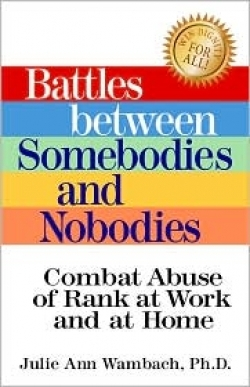Battles between Somebodies and Nobodies
Combat Abuse of Rank at Work and at Home
- 2008 INDIES Finalist
- Finalist, Self-Help (Adult Nonfiction)
School shootings, abuses of power in the workplace, and spousal or child abuse are results of what Dr. Julie Wambach calls “rankism,” or “the abuse of position within a hierarchy.” Wambach identifies “rankists” as individuals who “move to meet their personal needs while depriving others of their own. They treat humans as objects without concern for individual feelings or safety.” Rankist behaviors, whether exhibited by those considered “somebodies,” or those seen as “nobodies” within a group, have damaging consequences for the individuals who engage in them, the groups to which they belong, and often, to innocent bystanders.
All social creatures naturally arrange themselves in hierarchies, with different levels claiming for themselves different rights, privileges, and responsibilities. In more complex societies, individuals may belong to more than one hierarchy—a teacher, for example, may be at the highest level in his classroom, but at the bottom in his theatre group. In hierarchies that function well, all members are seen as vital to the efficient functioning of the whole, and are respected for performing their functions well; when a hierarchy is dysfunctional, rank is used as a means to control, or even harm, those of different rank.
The author avers that rankism, which she sees as the cause of violence and wars, is a communication problem. Instead of faulting hierarchies for the problems and battles that occur within them, she asserts that “Rankist battles are created by Somebodies and Nobodies who abuse their position within a hierarchy. Learning to take responsibility for our own parts in rankist battles is an important step toward achieving right-rank and stopping the cycle of rankism.”
Wambach is a counselor, workshop leader, speaker, coach, activist, and author who has brought her interest in the dynamics of power in human interaction to the study of abuse in hierarchical structures. She mediates disputes for a variety of governmental and nonprofit agencies. Wambach earned her doctorate in Adult Development and Aging at Arizona State University.
This compelling and much-needed book offers the key to identifying rankist behaviors not just in others, but in oneself, and presents exercises to aid anyone involved in social groups, including parents, educators, managers, and employees in developing the skills that lead to group relationships characterized by mutual respect and dignity.
Reviewed by
Kristine Morris
Disclosure: This article is not an endorsement, but a review. The publisher of this book provided free copies of the book to have their book reviewed by a professional reviewer. No fee was paid by the publisher for this review. Foreword Reviews only recommends books that we love. Foreword Magazine, Inc. is disclosing this in accordance with the Federal Trade Commission’s 16 CFR, Part 255.

